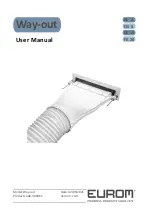
65
Abnormal point/ Condition
When it consecutively occurs 3times that the compressor stops
for overcurrent protection or start-up failure protection within
1minute start-up.
When discharge temperature thermistor, fin temperature
thermistor, defrost thermistor, P.C. board temperature
thermistor or ambient temperature thermistor shorts or opens
during compressor running.When discharge temperature
When nonvolatile memory data cannot be read properly,
compressor stops.
When 14A (SUZ-KA25VA(H))/24A (SUZ-KA35VA(H)) current
flows into intelligent power module.
When discharge temperature thermistor exceeds 116
,
compressor stops. Compressor can restart if discharge
temperature thermistor reads 100
or less 3 minutes later.
When temperature of fin temperature thermistor on the heat
sink exceeds 83
(SUZ-KA25VA(H))/82
(SUZ-KA35VA(H))
or temperature of P.C. board temperature thermistor exceeds
85
(SUZ-KA25VA(H))/81
(SUZ-KA35VA(H)), compressor
stops and restarts 3 minutes later.
When indoor coil thermistor exceeds 70
in HEAT mode.
When the defrost thermistor exceeds 70
in COOL mode.
When current from power outlet exceeds 6.1A
(SUZ-KA25VA(H))/9.2A (SUZ-KA35VA(H)), compressor
frequency lowers.
When indoor coil thermistor exceeds 55
in HEAT mode,
compressor frequency lowers.
When indoor coil thermistor reads 8
or less in COOL mode,
compressor frequency lowers.
When discharge temperature thermistor exceeds 111
,
compressor frequency lowers.
When discharge temperature has been 50
or less for 20
minutes.
No.
1
2
3
6
7
8
9
14
15
16
17
18
Symptom
LED indication
Detection method
Check point
Outdoor unit
does not
operate
'Outdoor unit
stops and
restarts 3
minutes later'
is repeated
Outdoor unit
operates
Outdoor unit
operates
1-time flash every
2.5 seconds
2-time flash
2.5 seconds OFF
3-time flash
2.5 seconds OFF
4-time flash
2.5 seconds OFF
5-time flash
2.5 seconds OFF
1-time flash
2.5 seconds OFF
3-time flash
2.5 seconds OFF
4-time flash
2.5 seconds OFF
7-time flash
2.5 seconds OFF
Outdoor power
system
Outdoor
thermistors
Outdoor control
system
Overcurrent
protection
Discharge
temperature
overheat
protection
Fin temperature
/P.C. board
temperature
thermistor
overheat protection
High pressure
protection
Frequency drop by
current protection
Frequency drop by
high pressure
protection
Frequency drop by
defrosting in COOL
mode
Frequency drop by
discharge
temperature
protection
Low discharge
temperature
protection
· Check stop valve.
· Reconnect connector of compressor.
· Refer to 12-5.
"How to check
inverter/ compressor".
· Refer to 12-5.
"Check of outdoor
thermistors".
· Check stop valve.
· Reconnect connector of compressor.
· Refer to 12-5.
"How to check
inverter/compressor".
Replace inverter P.C. board.
· Check refrigerant circuit and
refrigerant amount.
· Refer to 12-5.
"Check of LEV".
· Check around outdoor unit.
· Check outdoor unit air passage.
· Refer to 12-5.
"Check of outdoor
fan motor".
· Check refrigerant circuit and
refrigerant amount.
· Check stop valve.
The unit is normal, but check the
following.
· Check if indoor filters are clogged.
· Check if refrigerant is short.
· Check if indoor/outdoor unit air
circulation is short cycled.
· Refer to 12-5.
"Check of LEV".
· Check refrigerant circuit and
refrigerant amount.
Inverter P.C. board (Parts side)
LED
Flashing
Refer to 12-5.
"
"How to check
mis-wiring and serial signal error.
Refer to 12-2-3.
Check [output pattern B]
When the communication failure between the indoor and
outdoor unit for 3 minutes.
Serial signal
8-time flash
2.5 seconds OFF
Compressor
synchronous
abnormality
When the waveform of compressor current is distorted.
· Reconnect connector of compressor.
· Refer to 12-5.
"How to check
inverter/compressor".
8-time flash
2.5 seconds OFF
PAM protection
PAM:
Pulse
Amplitude
Modulation
When the overcurrent flows into IGBT (Insulated Gate Bipolar
transistor : TR821) or when the bus-bar voltage reaches 320V
or more, PAM stops and restarts.
This is not malfunction.
PAM protection will be activated in
the following cases;
Instantaneous power voltage drop
(Short time power failure)
When the power supply voltage is
high.
9-time flash
2.5 seconds OFF
Inverter check
mode
When the connector of compressor is disconnected, inverter
check mode starts.
Check if the connector of the
compressor is correctly connected.
Refer to 12-5.
"How to check
inverter/ compressor".
4
10
19
10-time flash
2.5 seconds OFF
Outdoor fan
6-time flash
2.5 seconds OFF
When outdoor fan has stopped within 30 seconds 3 times a
row after outdoor fan start-up, unit stops.
· Refer to 12-5.
"Check of outdoor
fan motor.
· Refer to 12-5.
!
"Check of inverter
P.C. board.
11
12
13
12-time flash
2.5 seconds OFF
Each phase current
of compressor
When compressor each phase current cannot be detected
normally
· Refer to 12-5.
"How to check
inverter/compressor".
13-time flash
2.5 seconds OFF
DC voltage
When DC voltage of inverter cannot be detected normally.
· Refer to 12-5.
"How to check
inverter/compressor".
· Check refrigerant circuit and
refrigerant amount.
· Refer to 12-5.
"Check of
LEV".
· Refer to 12-5.
"Check of
outdoor thermistors".
When outdoor unit is defective.
Outdoor unit
(Other abnormality)
5
14-time flash
2.5 seconds OFF
The flashing frequency shows the number of times the LED blinks after every 2.5-second OFF.
(Example) When the flashing frequency is “2”.
ON
OFF
2.5-second OFF
2.5-second OFF
0.5-second ON
0.5-second ON
12-3. Troubleshooting check table
SUZ-KA25VA(H) SUZ-KA35VA(H) (Except for SUZ-KA25/35VA(H)R1.TH)
NOTE 1. The location of LED is illustrated at the right figure. Refer to 12-6-1.
2. LED lights up during normal operation.
















































